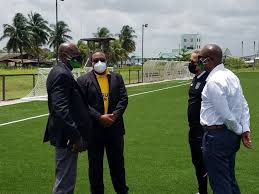
The Suspension and Firing of the Guyana Head Coach
In a shocking turn of events, the head coach of the Guyana national football team has been suspended and subsequently fired amid serious allegations that have sent ripples through the football community. This incident not only raises questions about accountability in sports but also highlights the challenges faced by governing bodies in addressing misconduct.
The coach, who had been at the helm for several seasons, was initially suspended following accusations of abusive behavior towards players. Reports emerged from various team members detailing a toxic environment that not only affected morale but also performance on the pitch. Allegations included verbal harassment, intimidation, and inappropriate comments that crossed professional boundaries.
This situation came to light during a series of interviews conducted by an investigative journalist, who had been tipped off by an anonymous source within the team. As more players began to share their experiences, it became clear that the issues were systemic, rooted in a culture that had allowed such behavior to go unchecked for far too long.
The Guyana Football Federation (GFF) took swift action upon receiving these allegations. The board convened an emergency meeting to address the claims and assess the situation. While the coach was initially placed on administrative leave, the GFF made it clear that they were taking the matter seriously, stating, “We are committed to fostering a safe and respectful environment for our players and staff.”
Despite the suspension, the outcry from the football community only intensified. Former players, coaches, and fans took to social media to express their support for the affected players and to demand accountability. Many emphasized the importance of creating a culture of respect within sports, particularly in environments where young athletes are vulnerable to exploitation and abuse.
The decision to terminate the coach’s contract came just days later. The GFF, after reviewing the evidence and considering the testimonies of numerous players, concluded that the allegations were credible and warranted immediate action. The federation released a statement that read, “We stand in solidarity with our players and are committed to making our sport a safe space for everyone. There is no room for abusive behavior in football.”
The coach’s dismissal sparked a broader conversation about the prevalence of misconduct in sports, particularly in regions where oversight may be lacking. Advocates for player rights have long argued that many athletes, especially at the youth and semi-professional levels, often feel powerless in the face of authority figures who wield significant influence over their careers.
In the aftermath of the firing, calls for reform grew louder. Many stakeholders in Guyana’s football landscape, including players, parents, and former athletes, began to push for the establishment of a formal reporting mechanism for misconduct. They advocated for workshops on athlete rights and mental health, emphasizing the need for education on recognizing and reporting inappropriate behavior.
This incident has also caught the attention of international football organizations. FIFA and CONCAVE have expressed their concern regarding the situation and have offered resources to assist the GFF in developing protocols for addressing misconduct. Such support underscores the recognition that the integrity of the sport depends on the well-being of its players.
The removal of the coach marks a critical juncture for Guyanese football. It serves as a stark reminder that leadership comes with a profound responsibility to nurture and protect those under one’s care. The hope is that this incident will catalyze necessary changes within the organization, leading to a more transparent and accountable system.
As the dust settles, the focus now shifts to the players who bravely came forward. Their courage has not only sparked change within their own team but has the potential to influence other organizations in the region. The path forward will require diligence and a commitment to ensuring that such abuses do not happen again.
In conclusion, the suspension and firing of the Guyana head coach is a pivotal moment for the nation’s football. It reflects a growing intolerance for misconduct in sports and highlights the need for systemic change. The hope is that this incident will inspire other organizations to confront similar issues, fostering an environment where athletes can thrive without fear of harassment or abuse. Through collective action and accountability, the future of football in Guyana—and beyond—can become a safer and more respectful space for all.
Leave a Reply